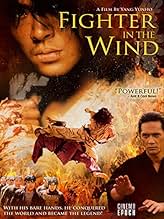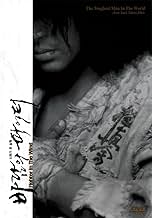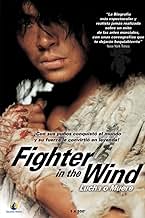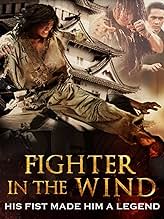IMDb RATING
6.9/10
4.3K
YOUR RATING
It is a Korean boy who went to Japan and started to learn Karate from his brother.It is a Korean boy who went to Japan and started to learn Karate from his brother.It is a Korean boy who went to Japan and started to learn Karate from his brother.
- Awards
- 1 win & 2 nominations total
Kim Won-shik
- Boy
- (as Won-sik Kim)
- Director
- Writers
- All cast & crew
- Production, box office & more at IMDbPro
Featured reviews
'Paramui Paito (Fighter in the Wind) is based on the events in the life of legendary Korean martial artist Choi Bae-dal. Or more precisely, the film is based on the comic book based on the martial artist's life _ a difference that can be felt throughout this entertaining but factually suspect movie.
The first of a handful of local films about famous Koreans who lived during the Japanese occupation period, ''Fighter in the Wind tells of the early part of Choi¡¯s life, how he sneaked into Japan in the late 1930s in hopes of becoming a pilot, joined the martial arts community there, and after training by himself in the mountains for 18 months, came down to become the top fighter of that country.
The film offers a seemingly sentimentalized version of the same story, especially playing up the outsider aspect of Choi's experiences, of his being a Korean in Japanese society. Given the story's xenophobic elements, which include evil yakuzas exploiting Koreans, it will be interesting to see how a Japanese audience responds to the film when it gets released there as planned.
''Fighter¡¯s best moments hint at the moral complexity of films like ''Raging Bull,¡¯¡¯ Martin Scorcese¡¯s boxing masterpiece. At first, Choi¡¯s motivation to become Japan¡¯s best seems to be connected to righting injustices felt by Koreans in Japan, but as he travels to martial arts schools enduring punishment after punishment, it becomes less clear as to what he is trying to prove.
But such insights are all too brief in the film, which is so heavy on the melodrama and action that it's difficult to take too seriously. By the end, the story resembles a kung fu film from Hong Kong, complete with a geisha girlfriend (Ara Hirayama), who tries to turn Choi into a lover not a fighter, and elder statesmen of the Japanese martial arts community who will go to any lengths to keep a Korean from becoming Japan's best. It's not the most inventive of plots, but the film keeps it entertaining throughout.
Singer and actor Bi (Rain) was initially cast for the lead role of Choi but had to pull out due to schedule conflicts. It¡¯s a good thing too, for the rail-thin pop singer wouldn¡¯t have been able to take the physical punishment the role required.
Instead, we get Yang Dong-geun, a burly actor who plays the part to near perfection. It¡¯s refreshing to see this young and talented actor take on a substantial role for a change, and he brings to ''Fighter the necessary savagery and physical presence to make it work.
The first of a handful of local films about famous Koreans who lived during the Japanese occupation period, ''Fighter in the Wind tells of the early part of Choi¡¯s life, how he sneaked into Japan in the late 1930s in hopes of becoming a pilot, joined the martial arts community there, and after training by himself in the mountains for 18 months, came down to become the top fighter of that country.
The film offers a seemingly sentimentalized version of the same story, especially playing up the outsider aspect of Choi's experiences, of his being a Korean in Japanese society. Given the story's xenophobic elements, which include evil yakuzas exploiting Koreans, it will be interesting to see how a Japanese audience responds to the film when it gets released there as planned.
''Fighter¡¯s best moments hint at the moral complexity of films like ''Raging Bull,¡¯¡¯ Martin Scorcese¡¯s boxing masterpiece. At first, Choi¡¯s motivation to become Japan¡¯s best seems to be connected to righting injustices felt by Koreans in Japan, but as he travels to martial arts schools enduring punishment after punishment, it becomes less clear as to what he is trying to prove.
But such insights are all too brief in the film, which is so heavy on the melodrama and action that it's difficult to take too seriously. By the end, the story resembles a kung fu film from Hong Kong, complete with a geisha girlfriend (Ara Hirayama), who tries to turn Choi into a lover not a fighter, and elder statesmen of the Japanese martial arts community who will go to any lengths to keep a Korean from becoming Japan's best. It's not the most inventive of plots, but the film keeps it entertaining throughout.
Singer and actor Bi (Rain) was initially cast for the lead role of Choi but had to pull out due to schedule conflicts. It¡¯s a good thing too, for the rail-thin pop singer wouldn¡¯t have been able to take the physical punishment the role required.
Instead, we get Yang Dong-geun, a burly actor who plays the part to near perfection. It¡¯s refreshing to see this young and talented actor take on a substantial role for a change, and he brings to ''Fighter the necessary savagery and physical presence to make it work.
6Ky-D
I was pretty excited when this hit theaters. There was a lot of buzz floating around about it being the next great martial arts film. Unfortunately, for everything it does right, it does equal wrong.
For starters, this is a martial arts film, so you would assume there would be lots of fighting. And there is fighting, just not all that much. Most of the film is littered with lengthy dialogue scenes that are intended to deepen the characters, but this fails as well. Character motivation seems to be limited to "spur of the moment" reasoning and the ultimate plot is nothing more than standard fight-film fare (boy gets beat up a lot, boy trains, boy beats up everybody).
This isn't to say that the film doesn't have some positive aspects. The film is gorgeous; color, cinematography, lighting, all handled with expert flare. As for the fights (when the film gets around to them), they are excellent. Eskewing the modern trend penchant for treating fights like elaborate dance sequences, here instead we get some real hard-hitting brawls that also maintain a look of grace.
If only the filmmakers had put as much effort into the writing as they did into the look of the film, this could easily have been one of the top martial art films, instead of mild entertainment destined to be forgotten.
Score: 6/10
For starters, this is a martial arts film, so you would assume there would be lots of fighting. And there is fighting, just not all that much. Most of the film is littered with lengthy dialogue scenes that are intended to deepen the characters, but this fails as well. Character motivation seems to be limited to "spur of the moment" reasoning and the ultimate plot is nothing more than standard fight-film fare (boy gets beat up a lot, boy trains, boy beats up everybody).
This isn't to say that the film doesn't have some positive aspects. The film is gorgeous; color, cinematography, lighting, all handled with expert flare. As for the fights (when the film gets around to them), they are excellent. Eskewing the modern trend penchant for treating fights like elaborate dance sequences, here instead we get some real hard-hitting brawls that also maintain a look of grace.
If only the filmmakers had put as much effort into the writing as they did into the look of the film, this could easily have been one of the top martial art films, instead of mild entertainment destined to be forgotten.
Score: 6/10
This korean movie claims to be inspired by the life of Choi Bae-dal, who founded the kyokushinkaikan variation of Karate, and the film explores the prejudice between the Koreans and the Japanese back then.
The setting is in post-WWII Japan, with Yakuzas and American GIs abound, not to mention the influx of Korean immigrants. This film narrates the life of Bae-dal in a fairly straightforward way, following his path to fame amongst fighters - taking on karate, judo and even kendo exponents.
Somehow this film parallels Stephen Chow's KungFu Hustle, which also narrates the life of a nobody to a somebody, with a pretty babe in tow for good measure, except this one is without the slapstick comedy.
The first half plods on, as our protagonist is still a greenhorn in the martial arts world. Once you've gotten past the first hour, things start to pick up when he trains himself to be the best of the best, but towards the finale, it somehow hints of Tom Cruise's The Last Samurai. Probably no fault of its own, as it explores the same theme amongst all martial arts - honour and justice.
The fight scenes, which looked spectacular in the trailers, actually offers nothing new. Most of it are quick cuts and slow motion, and given the premise, could've offered more in terms of actual fights.
This should appeal to those who wanna know more about the myth behind Kyokushinkaikan Karate. If you're looking for real Kung-Fu action, you'll probably be better off with a Jet Li martial arts movie.
The setting is in post-WWII Japan, with Yakuzas and American GIs abound, not to mention the influx of Korean immigrants. This film narrates the life of Bae-dal in a fairly straightforward way, following his path to fame amongst fighters - taking on karate, judo and even kendo exponents.
Somehow this film parallels Stephen Chow's KungFu Hustle, which also narrates the life of a nobody to a somebody, with a pretty babe in tow for good measure, except this one is without the slapstick comedy.
The first half plods on, as our protagonist is still a greenhorn in the martial arts world. Once you've gotten past the first hour, things start to pick up when he trains himself to be the best of the best, but towards the finale, it somehow hints of Tom Cruise's The Last Samurai. Probably no fault of its own, as it explores the same theme amongst all martial arts - honour and justice.
The fight scenes, which looked spectacular in the trailers, actually offers nothing new. Most of it are quick cuts and slow motion, and given the premise, could've offered more in terms of actual fights.
This should appeal to those who wanna know more about the myth behind Kyokushinkaikan Karate. If you're looking for real Kung-Fu action, you'll probably be better off with a Jet Li martial arts movie.
I was impressed and satisfied with Fighter In The Wind. Most martial arts movies tend not to be very serious, but in terms of grit and realism, this was one of the few martial arts movies that maintained complete seriousness throughout.
Apparently, it is biographical of a real karate master, which I didn't realize until the end. It is also apparently based on a comic book version of the story, which in hindsight is easy to see in the colorful and visually well-arranged cinematography. Many different environments, landscapes and buildings are encountered in the course of the story, and they are all beautifully presented. The director is a master at his craft.
Baedal's geisha girlfriend, played by Aya Hirayama, is absolutely stunningly beautiful, and the movie is worth watching just for her. But it is a good movie in its own right, with a good portrayal of the Korean minority in Japan just after World War II. Although parts of the story and characters lack depth, I do find the movie generally satisfying, except in one respect: As the other commentators point out, it doesn't have a great deal of fighting, and the fights it does have are brief and relatively unimpressive - all the more so because Baedal apparently doesn't use any specific style. It doesn't ring true, either, that he gets to challenge every kind of martial arts school, from karate to judo and others. Would such schools accept challenges from someone with such an unspecific fighting style? I doubt it. But, I'm no expert on this.
In any case, despite these flaws, I think the overall style of the movie is very well made, and I enjoyed it a lot. I'd definitely recommend it to any fan of martial arts and action movies.
My rating: 7 out of 10.
Apparently, it is biographical of a real karate master, which I didn't realize until the end. It is also apparently based on a comic book version of the story, which in hindsight is easy to see in the colorful and visually well-arranged cinematography. Many different environments, landscapes and buildings are encountered in the course of the story, and they are all beautifully presented. The director is a master at his craft.
Baedal's geisha girlfriend, played by Aya Hirayama, is absolutely stunningly beautiful, and the movie is worth watching just for her. But it is a good movie in its own right, with a good portrayal of the Korean minority in Japan just after World War II. Although parts of the story and characters lack depth, I do find the movie generally satisfying, except in one respect: As the other commentators point out, it doesn't have a great deal of fighting, and the fights it does have are brief and relatively unimpressive - all the more so because Baedal apparently doesn't use any specific style. It doesn't ring true, either, that he gets to challenge every kind of martial arts school, from karate to judo and others. Would such schools accept challenges from someone with such an unspecific fighting style? I doubt it. But, I'm no expert on this.
In any case, despite these flaws, I think the overall style of the movie is very well made, and I enjoyed it a lot. I'd definitely recommend it to any fan of martial arts and action movies.
My rating: 7 out of 10.
I watched this movie the other night, but i found it quite enjoyable. While I will agree that though there are enough fights, they aren't nearly long enough. But the length of the fight isn't what makes them good, it's how well they're done with the time given. Like if you're going to throw a punch at someone, but stop yourself only centimeters from your target, proving to everyone that you have defeated him and he was powerless to stop you, well that is pure quality right there. I loved the main character. He willingly put himself through hell with his training, and became one of the most focused and determined fighters i've ever seen in a movie The story wasn't the best, but i still found this movie fun
Did you know
- TriviaThis movie is based on the true life story of Choi Yeong-eui (who later changed his name to Masutatsu Oyama), the founder of Kyokushin Karate. Choi was born in South Korea in 1923, immigrated to Japan in 1938, and founded the Kyokushin Karate organization in 1953. Currently, Kyokushin Karate is practiced by more than 12 million practitioners in over 120 countries around the world.
- ConnectionsFeatured in WatchMojo: Top 10 Underrated Martial Arts Movies (2017)
- SoundtracksIllusive Consensus
Lyrics by Simone Simons
Music by Mark Jansen, Ad Sluijter, Coen Janssen Simone Simons
Performed by Epica
- How long is Fighter in the Wind?Powered by Alexa
Details
- Release date
- Country of origin
- Official site
- Languages
- Also known as
- Fighter in the Wind
- Filming locations
- See more company credits at IMDbPro
Box office
- Budget
- $6,000,000 (estimated)
- Gross worldwide
- $1,518
- Runtime2 hours
- Color
- Sound mix
- Aspect ratio
- 1.85 : 1
Contribute to this page
Suggest an edit or add missing content


























